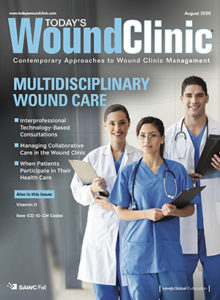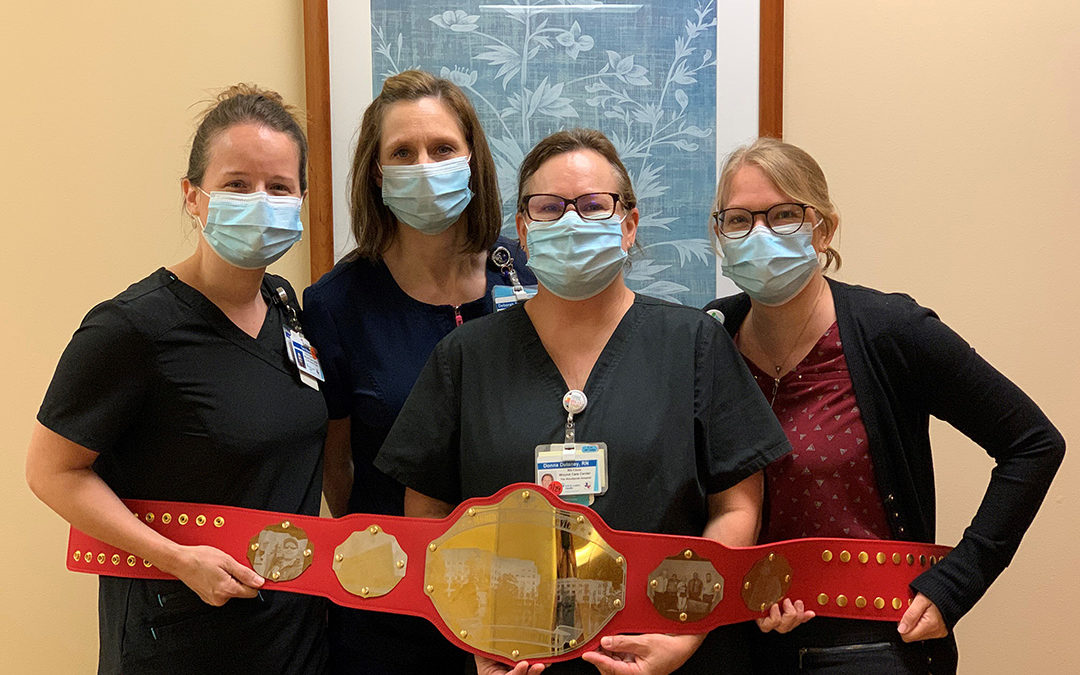The theme of the August issue of Today’s Wound Clinic is “Multidisciplinary Care.” I decided to interview my amazing staff (pictured holding the hospital award for the clinic coming back the strongest since the pandemic, from left to right: Tara Stone, Debi Thompson, Donna Dulaney and Michelle Hebert). I think every physician who practices wound management ought to read this interview. They were brutally honest and probably said some things that other nurses would like to say but haven’t had a “safe space.” I welcome the constructive comments of other nurses, technicians, and therapists about how we can collaborate better in the care of our very complex patients. Here’s a safe space for those comments.
 Me: What do you think it means to “collaborate” in the care of a patient with wounds?
Me: What do you think it means to “collaborate” in the care of a patient with wounds?
Debi: Sharing feedback and respecting the feedback given. Our doctors do a good job of handling the concerns that we come to you with regarding the patients.
Tara: Having undivided attention. None of us can collaborate well if the other person is distracted or simply not focused on the conversation.
Me: What frustrates you in collaborating with doctors—me included?
Debi: My biggest frustration is being degraded in front of the patient after I have made a suggestion. I also get frustrated being told by the doctor (in front of the patient) how to apply a dressing since I am pretty sure I know how to put on the dressings. And if there are issues about how I do something or if I need to be corrected, I think we should discuss them away from the patient.
Me: What are some ways that I (or any doctor) could empower you to do a better job or ways that doctors actually prevent you from providing the best care?
Debi: Once the physician is finished with the visit, it actually helps me if they move on to the next patient. We can get a lot of teaching done at the end of the visit while doing the dressings but it is easier to do that when you are not in the room! We try to explain what we are doing, and it’s important to me that the patient is able to listen.
Tara: It helps if the doctor does not hover over us while we are doing the dressing, like they are trying to make sure it is done correctly, or chastise us in front of the patient. Also, while it is useful for us to discuss dressing option A (particularly when the situation is a tricky one), it’s very disempowering when the doctor either doesn’t ask our opinion or just ignores the suggestions we make.
Me: Is there something that you wish every wound care practitioner knew about working collaboratively?
Debi: Patients have told me that hearing us collaborate in the room actually makes them feel confident we are providing the best care. Perhaps not every patient feels this way, but most appreciate that we are a team and listen to each other.
Tara: Sometimes the dressing or plan is just too complicated, and it means the staff has to do a lot of patient instruction and will likely answer phone calls requesting more explanation. We could collaborate better if everyone remembered that if possible, a simple dressing regimen is the best one.
This is just a taste of the full interview, which is available on the TWC website.
I hope we physicians can take these honest comments to heart. I think my staff are the best, and I posted this little video “thank you” to them (which I created in the happy days before COVID-19 and mandatory mask wearing) on my YouTube channel.
Caroline

Dr. Fife is a world renowned wound care physician dedicated to improving patient outcomes through quality driven care. Please visit my blog at CarolineFifeMD.com and my Youtube channel at https://www.youtube.com/c/carolinefifemd/videos
The opinions, comments, and content expressed or implied in my statements are solely my own and do not necessarily reflect the position or views of Intellicure or any of the boards on which I serve.




Trackbacks/Pingbacks